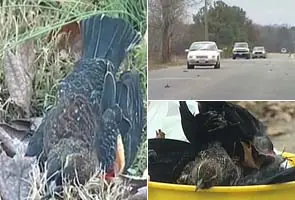In early January 2011, residents of Beebe, Arkansas, were shocked to discover approximately 2,000 dead red-winged blackbirds scattered across the town. Environmental service workers completed the cleanup operation on Sunday, January 2, after an intensive effort to collect the birds. According to Beebe’s mayor, Mike Robertson, the last bird was picked up around 11 a.m., with a team of 12 to 15 workers donning environmental suits for the task. The cleanup began the previous day and covered a one-mile area where the birds had fallen.
The birds were reported to have fallen from the sky on the night of December 31, 2010. Aerial surveys conducted shortly after the incident confirmed that no additional dead birds were found beyond the designated area. The U.S. Environmental Services team, responsible for the cleanup, acted promptly to ensure that the situation was contained. Mayor Robertson clarified that the workers’ protective gear was a precautionary measure rather than a response to any specific health threat from the birds.

The exact cause of the birds’ deaths remains unclear. While some speculated that a disease or poisoning might be to blame, Robertson noted that these theories were unlikely. The mayor pointed out that a large roost of red-winged blackbirds had been using the town’s wooded areas for several years, and no dead birds were found in these areas, which might rule out illness or poisoning as potential causes.
Karen Rowe, an ornithologist with the Arkansas Game and Fish Commission, suggested that the birds could have suffered from physical trauma due to lightning strikes or high-altitude hail. Another possibility was that the fireworks from New Year’s Eve celebrations might have startled the birds, causing them to die from stress or panic. Wildlife officer Robby King collected about 65 of the dead birds for further examination, with samples sent to state and national wildlife labs for testing.
Similar incidents involving mass bird deaths have been reported elsewhere, but test results often remain inconclusive. Rowe expressed skepticism about poisoning being the cause, reflecting a broader uncertainty about the event’s underlying cause. The situation in Beebe remains a mystery, with ongoing investigations aimed at understanding the factors behind the sudden and dramatic loss of wildlife.
